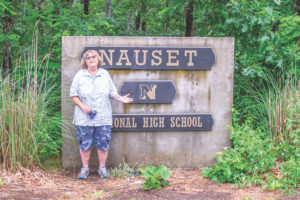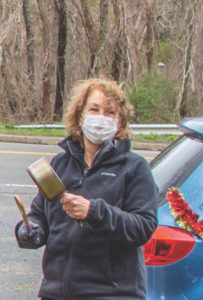Massachusetts had the ninth-highest turnout of voters ages 18 to 29 in the U.S. in the 2018 midterms — a 17.3-percent increase over their participation in 2014. While that’s good news, the bottom line is still that only one third of the young voters in Massachusetts went to the polls. Local educators offer a reason young people feel apathetic about political participation: the stakes don’t feel personal.

The commonwealth introduced new curriculum frameworks for social studies and history in 2018. The main change was an increased emphasis on civics, as well as fostering a deeper understanding of the country’s diversity. In theory, every student in the public schools is required to have at least a year’s worth of civics before graduating from high school.
But in practice, civics can be woven into the U.S. history curriculum as much or as little as individual teachers decide.
During an informal and socially distant conversation outside Nauset Regional High School with Wellfleet’s Lisa Brown and two of her students, the students emphasized that teachers make a big difference in determining whether they get involved in public affairs or not. Brown teaches Nauset’s course called Exploring and Respecting Differences.
Brown’s class is all about connecting current events to students’ daily lives. “My start in local politics came from that,” said Victoria Valentino, a member of the Nauset class of 2019 from Brewster. During her freshman year at UMass Amherst, she became involved with several activist groups on campus.
Garrison Guzzeau, a rising senior at Nauset from Orleans, said he thinks many students love learning about civics and government, “but they’re still falling asleep in their history classes because there’s no personal appeal with dead historical figures. The classes are telling you what these things are, but not how to engage with them.”
Brown’s philosophy is that big-picture politics and current events can leave young people unable to act — not because they don’t care, but because they find it overwhelming. Making things more personal is what shifts students from apathy to action, Brown said.
“Kids hunger for an understanding of who they are,” said Brown. When students feel connected, they empathize, Brown said, which “gives them the urge to fight for something bigger than themselves.”
Brown teaches three levels of Exploring and Respecting Differences. In the honors level, participating students explore action-based advocacy through activities like going to the Mass. State House to meet with Cape Cod representatives and participating in political demonstrations in order to voice their concerns or ideals. “Through this, they gain a more open perception of themselves and the people they can become,” said Brown.

Lynn Fleischer explained her similar approach to the development of political opinion in the grade 12 Challenges of Democracy class she teaches at Cape Cod Regional Technical High School. At the start of each year, she gives her students a 50-question survey to help gauge the class’s perspectives and to aid their understanding of what it means to be a member of a political party.
Through activities like mock elections, teaching about media literacy, and connecting modern-day politics to pertinent issues such as personal finances, Fleischer creates an environment she feels is “conducive to respectful debate.”
As for her own views on controversial issues, Fleischer said, “I do not share my political opinions with my students. My job is to give the students the tools to think about issues, not tell them what to think. I explain it to them this way: ‘If you like me, you might just absorb my opinion without thinking critically about the issue. If you do not like me, you might reject my opinion, again without thinking critically.’ ”
Civics education now starts in the eighth grade with a year-long curriculum. Maggie Glennon, an eighth-grade social studies teacher at Nauset Middle School, said she also sees the importance of a personal connection. “The closer to home, the easier it is for them to buy in,” said Glennon.
The capstone of Nauset’s eighth-grade civics course is a project in which students identify a local problem and break down ways to solve it, with the goal of having something complete enough to present to a school board. Glennon described the example of there not being a local YMCA, and outlined the steps to be taken through governmental procedures to fix the problem.
Valentino said she plans to vote in the upcoming election. Her reason? “I now know how to use the power that I have as a young person.”
Allyson Birger’s summer fellowship with the Independent is supported by the Jonathan M. Tisch College of Civic Life at Tufts University.
